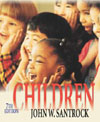 |  Children, 7/e John W. Santrock,
University of Texas, Dallas
Cognitive Development in Early Childhood
Web Links (Referenced in Text Margins)Symbolic Thinking
(http://www.sesameworkshop.org/oops/0,1451,bert,00.html)
Explore young children's symbolic thinking during the early childhood years. |
 |  |  | Vygotsky Links
(http://arts.uwaterloo.ca/~acheyne/chp.html)
Provides lists of various remote and local articles related to Vygotsky in both the cultural and historical contexts of psychology. |
 |  |  | Scaffolding
(http://edweb.sdsu.edu/people/bdodge/scaffolding.html)
Read about the application of scaffolding to learning and the Internet, scaffolding and Vygotsky's theory, and constructivist exercises. |
 |  |  | Cognitive Apprenticeship
(http://borg.lib.vt.edu/ejournals/JITE/v33n3/duncan.html)
Evaluates the importance of using a cognitive apprenticeship approach in classroom instruction. Includes applications to industrial and technical education. |
 |  |  | Pragmatic Language
(http://www.kidsource.com/asha/language_tips.html)
Provides pragmatic language tips, examines adaptive language use, and evaluates conversation and narration skills in young children. |
 |  |  | Literacy
(http://www.ed.gov/offices/OERI/ECI/newsletters/97fall/)
Read about early childhood development and the America Reads Challenge, family literacy studies, parents as teachers, prevention of reading problems in children, and many more literacy topics. |
 |  |  | NAEYC
(http://www.naeyc.org/)
The web site of the National Association for the Education of Young Children (NAEYC) with information about this organization and position statements on many topics, such s curriculum guidelines, learning to read and write, prevention of child abuse, school readiness, technology and young children, and developmentally appropriate practice. |
 |  |  | High/Scope: Active Learning
(http://www.ed.gov/pubs/EPTW/eptw11/eptw11e.html)
Read about the importance of emphasis on young children as active learners, who construct knowledge, which is underscored in the High/Scope approach to early childhood education. |
 |  |  | Head Start Resources
(http://www2.acf.dhhs.gov/programs/hsb/)
Links to a number of sites with information about Project Head Start and the education of at-risk children. |
 |  |  | Poverty and Learning
(http://www.ed.gov/databases/ERIC_Digests/ed357433.html)
This ERIC Digest report covers how many children are in poverty, what the costs are, and other issues. |
|



 2003 McGraw-Hill Higher Education
2003 McGraw-Hill Higher Education